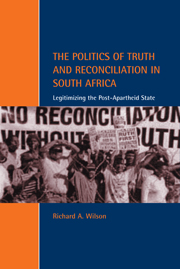Crossref Citations
This Book has been
cited by the following publications. This list is generated based on data provided by Crossref.
Bland, Byron L
2002.
A tale of interesting conversations: Exploring reconciliation in Northern Ireland.
Conflict Resolution Quarterly,
Vol. 19,
Issue. 3,
p.
321.
Hamber, Brandon
and
Wilson, Richard A.
2002.
Symbolic closure through memory,reparation and revenge in post-conflict societies.
Journal of Human Rights,
Vol. 1,
Issue. 1,
p.
35.
Hlongwane, Gugu
2002.
What has modernity to do with it?: Camouflaging race in the “New” South Africa.
Journal of Literary Studies,
Vol. 18,
Issue. 1-2,
p.
111.
Colvin, Christopher J.
2003.
Introduction: Contingency and Creativity: South Africa after Apartheid.
Anthropology and Humanism,
Vol. 28,
Issue. 1,
p.
3.
Hovland, Ingie
2003.
Macro/Micro Dynamics in South Africa: Why the Reconciliation Process Will Not Reduce Violence.
Journal of Peacebuilding & Development,
Vol. 1,
Issue. 2,
p.
6.
Nytagodien, Ridwan
2003.
Classroom Confrontations.
Safundi,
Vol. 4,
Issue. 3,
p.
1.
Bethlehem, Louise
2003.
Aneconomy in an economy of melancholy: embodiment and gendered identity in J.M. Coetzee'sDisgrace.
African Identities,
Vol. 1,
Issue. 2,
p.
167.
Hansen, Birthe Rytter
2003.
Public Spaces for National Commemoration: The Case of Emlotheni Memorial, Port Elizabeth.
Anthropology and Humanism,
Vol. 28,
Issue. 1,
p.
43.
Wilson, Richard Ashby
2003.
Justice and Retribution in Postconflict Settings.
Public Culture,
Vol. 15,
Issue. 1,
p.
187.
Lee, Nae Young
2003.
The “Legacy Problem” and Democratic Consolidation in South Korea and the Philippines.
Journal of East Asian Studies,
Vol. 3,
Issue. 1,
p.
43.
Short, Damien
2003.
Australian ‘Aboriginal’ Reconciliation: The Latest Phase in the Colonial Project.
Citizenship Studies,
Vol. 7,
Issue. 3,
p.
291.
Zimmermann, Roland
2004.
Demokratie und das südliche Afrika.
p.
365.
Elster, Jon
2004.
Closing the Books.
Sundar, Nandini
2004.
Toward an anthropology of culpability.
American Ethnologist,
Vol. 31,
Issue. 2,
p.
145.
Henham, Ralph
2004.
Some Reflections on the Role of Victims in the International Criminal Trial Process.
International Review of Victimology,
Vol. 11,
Issue. 2-3,
p.
201.
Gibson, James L.
2004.
Truth, Reconciliation, and the Creation of a Human Rights Culture in South Africa.
Law & Society Review,
Vol. 38,
Issue. 1,
p.
5.
Mendeloff, David
2004.
Truth-Seeking, Truth-Telling, and Postconflict Peacebuilding: Curb the Enthusiasm?1.
International Studies Review,
Vol. 6,
Issue. 3,
p.
355.
Nagy, Rosemary
2004.
The Ambiguities of Reconciliation and Responsibility in South Africa.
Political Studies,
Vol. 52,
Issue. 4,
p.
709.
Sezgin, Yüksel
2004.
Theorizing Formal Pluralism: Quantification of Legal Pluralism for Spatio – Temporal Analysis.
The Journal of Legal Pluralism and Unofficial Law,
Vol. 36,
Issue. 50,
p.
101.
Rouhana, Nadim N.
2004.
Group identity and power asymmetry in reconciliation processes: The Israeli-Palestinian case..
Peace and Conflict: Journal of Peace Psychology,
Vol. 10,
Issue. 1,
p.
33.





